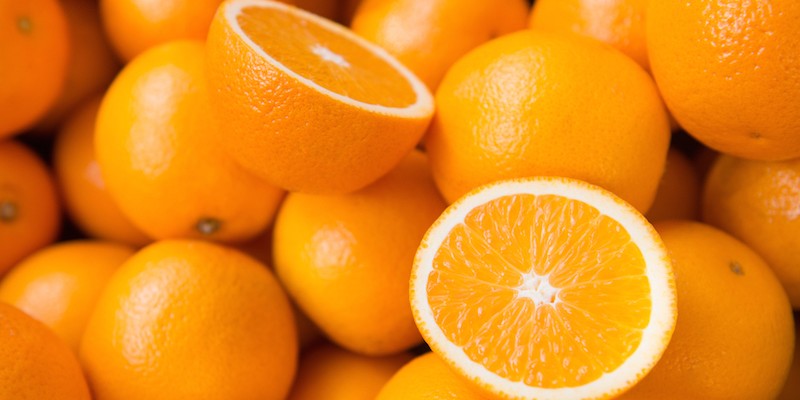Spotlight on Oranges
Juicy, sweet and renowned for its high concentration of vitamin C, oranges make the perfect snack and add a special tang to many recipes. In this post, we take a closer look at these delicious fruits (not to mention good for you to eat) and how you can get more in your diet.
Health Benefits
Vitamin C: Oranges are know for their high Vitamin C content, but why is Vitamin C so good for you? Vitamin C is the primary water-soluble antioxidant in the body, disarming free radicals and preventing damage in the aqueous environment both inside and outside cells. Inside cells, a potential result of free radical damage to DNA is cancer. Vitamin C can neutralise free radicals, it can help prevent the oxidation of cholesterol. It is also vital for the proper function of a healthy immune system, is good for preventing colds and may be helpful in preventing recurrent ear infections.
Protection against Cardiovascular Disease: The WHO (World Health Organizarion) conclude that a diet that features citrus fruits also offer protection against cardiovascular disease due to the folate found in citrus fruits. An orange has an average of 170 different phytonutrients and more than 60 flavonoids, many of which have anti-inflammatory, anti-tumour and blood clot inhibiting properties, as well as strong antioxidant effects.
Great source of Fibre: The fibre found in oranges can help out by keeping blood sugar levels under control, which explains why oranges can be a super healthy snack for people with diabetes. Fibre in oranges can also be helpful for reducing the uncomfortable constipation or diarrhea in those suffering from irritable bowel syndrome.
Selection and Availability
- Oranges are the largest citrus crop in the world. Navel Oranges are best in season in Spring and Winter. While Valencia Oranges are best fresh in Summer.
- The bigger the navel in an orange, the sweeter it will be.
- Choose fruits that are firm, yet yield to gentle pressure.
- Fresh oranges have bright colour, no wrinkles in the skin and feel heavy for their size (avoid overly soft oranges with spots and mould on them).
Transporting and Storing
- Have an optimal holding temperature of 0 to 1 degrees Celsius to maximise duration of shelf life. Moisture loss in the peel and pulp is the limiting factor in storage duration.
- Once they’ve been purchased and brought home, they can be kept at room temperature for a week or so but can keep well up to two weeks in the fridge.
- The should be kept loose in a fruit container in the fridge, away from excessive moisture as they tend to mould easily.
Serving Ideas
- The peel of retail purchase fresh oranges, while used as a flavour enhance in home cooking, are not usually consumed. It is usually removed and discarded, in effect reducing the risk of illness from any potential exterior biological contamination.
- Saute some onions and ginger, and then glaze the pan with orange juice. Use the liquid as a sauce that goes great with chicken or fish.
- Orange segments are a great addition to a salad.
- Have them as a snack – have an orange in your lunchbox.
- Who doesn’t love freshly squeeze orange juice? If you have a juicer or even just purchasing orange juice from your local supermarket, you’re able to enjoy all the benefits that an Orange can offer.
- Make your own fresh Orange marmalade.
